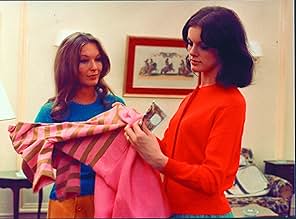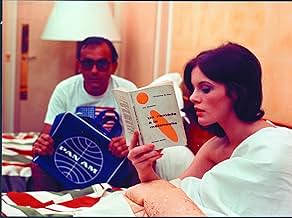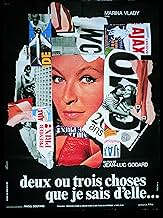Aggiungi una trama nella tua linguaA day in the life of a Parisian housewife/prostitute, interspersed with musings on the Vietnam War and other contemporary issues.A day in the life of a Parisian housewife/prostitute, interspersed with musings on the Vietnam War and other contemporary issues.A day in the life of a Parisian housewife/prostitute, interspersed with musings on the Vietnam War and other contemporary issues.
- Regia
- Sceneggiatura
- Star
- Premi
- 1 candidatura in totale
- Narrator
- (voce)
- Young Man
- (non citato nei titoli originali)
- Girl Talking to Robert
- (non citato nei titoli originali)
- Girl in Bath
- (non citato nei titoli originali)
- Christophe Jeanson
- (non citato nei titoli originali)
- Meter Reader
- (non citato nei titoli originali)
- Marianne
- (non citato nei titoli originali)
- Monsieur Gehrard
- (non citato nei titoli originali)
- Girl
- (non citato nei titoli originali)
- Man in Basement
- (non citato nei titoli originali)
- Author
- (non citato nei titoli originali)
- Pécuchet
- (non citato nei titoli originali)
- John Bogus
- (non citato nei titoli originali)
- Woman in Basement
- (non citato nei titoli originali)
- Bouvard
- (non citato nei titoli originali)
- Robert Jeanson
- (non citato nei titoli originali)
- Roger
- (non citato nei titoli originali)
Recensioni in evidenza
However, "narrative" or gender politics are really not the point of "2 or 3 Things...". First off, "her" is less a person, but a city- Paris. And it is just not Paris, as in the city of romance and art, but De gaulle's radical transformation of Paris from a pre-war city of antiquity to a modern commercial center. The film is framed around extended shots of constructions sites, developing freeways, and cranes for a reason- to show how this ancient city is being radically transformed with or without the benefit of its citizens. In a way, this film is a meditation on a phenomena spreading around the world from the 1990's to the present (and especially the United States)- urban gentrification. In the push to modernize and beautify a city, the powers that be often step on the majority which make up a city- the lower and middle class. Godard's precise comments on urban planning are 40 years ahead of their time. If anything, "2 or 3 Things..." is far more relevant today than in 1967.
Secondly, the film is an agit-prop protest against crass commercialism and how it defaces and devoids the human experience. The 2 or 3 women in the film (Paris included) are so wrapped up in the base drive for material goods that they forget the very principles of humanity- love, caring for one's family, intellectual desire, and compassion. Godard's definition of consumerism robs a society of its metaphysical compassion and leads intellectual and personal freedom into a locked room. In the age of I-Pods and Paris Hilton, Godard's sharp criticism of crass consumerism is amazingly relevant. It is a wonder that the Adbusters/Culture jam movement have not latched onto this film with a passion.
"2 or 3 Things..." also serves as one of the many watermarks of Godard's highly productive and influential 1960's period- blending the emotions of Contempt or Vivre Sa Vie with the chic radicalism of La Chinoise or Week End. Godard was an artist in constant evolution in the 1960's and "2 or 3 Things..." is one of these many evolutionary steps.
Be forewarned, "2 or 3 Things..." is NOT a good starting point for those new to Godard. It is far too meditative, "slow", and didactic for one to get a true sense of Godard's radical style. I strongly recommend Masculine-Feminine, Contempt, Breathless, Band of Outsiders, or Week End as a better starting point for Godard. A newcomer to Godard's style might be forever turned off by the slow pacing of "2 or 3 Things...". However, after digesting a few of this great film maker's works, line up "2 or 3 Things...". A timeless and extremely relevant film.
French's student movement turned into something of a cinema movement. To a small group of devoted young cinephiles, French film seemed like a cheap art - one capable of so much more but settled for so very little. Nobody seemed to want to experiment or toy with the medium in anyway. That is until Godard hit the scene, boasting a more assured and confident enigma and housing extremely radical and challenging themes and stylistic choices few had seen before.
I equate Godard's films to bad sex because it isn't until after watching them and reading a few thoughts by a miscellaneous bunch online do I realize if I liked them or not. His films are challenging because while watching them, you're sometimes lost in what they're trying to convey. But once you find an idea or some aesthetic attributes to latch on to, dissecting the film is a much easier process. In that respect, Godard's films may also be like an algebra test.
2 or 3 Things I Know About Her, however, is sex I never got around to fully enjoying and an algebra test I was never able to pass in the long-run. The film is nowhere near as indescribable or as impossibly vague and empty as Godard's latest work Film Socialisme, but its ability to baffle even fifty years late still holds true. This is a cinematic enigma like few others with sequences ranging from digestible and accessible to a complete mystery on my behalf.
What little coherent narrative there is focuses on Juliette Jeanson (Marina Vlady), a married bourgeois mother who begins her descent into prostitution. She drops her child off at a friend's who runs a business of watching the children of prostitutes before going about her day of shopping, cleaning the house, and meeting new clients. Godard's uniqueness in regard to the story is that he makes all of the sex lack any shred of eroticism and instead makes it rather silly (IE: a man makes a woman wear a shopping bag over her head).
Godard consistently interrupts this narrative with shots of whatever he feels like pointing the camera at with soft-spoken narration added over the images. Godard's narration often doesn't make a lot of sense, but his unpredictable comments and remarks provide the film with or feeling that he is watching this picture with us and giving his own commentary as it progresses.
During the time of 2 or 3 Things I Know About Her's release (1967 to be specific), Godard had become outspoken about his opposition towards Americanization and the ideas of the country as a whole. In the late sixties, prolific advertising began to turn up and, consequently, Godard saw this as an attack and began vocalizing his disdain for advertising. Frequently punctuating this particular picture are stray images of pop art, akin to the style Andy Warhol was famous for.
Of course, the meaning for the inclusions of these images is anyone's guess really. Godard makes his impressionistic style known and present and leaves us to form the thesis out of his work for ourselves it seems. This is one of the issues with this film as a whole. A film should never feel like it is handing you a series of clips and telling you to form an idea out of them without giving you a starting point or an anchor to latch on to. Even in the most impressionistic films by people like Ron Fricke or Gus Van Sant, there is a basic idea or concept that one can attach themselves to in order to try and form some ideas about the film's message.
Godard never seems to give us a starting point with 2 or 3 Things I Know About Her other than a compilation of clips that could very well have a deeper meaning if we knew just where the hell to begin. The pop art/advertising angle is something to go off of, but the film doesn't seem to focus on that nearly enough for it to be the main theme. And with that, even Juliette just seems like a character Godard includes to simply emphasize his appreciation and admiration for prostitutes.
As damning as 2 or 3 Things I Know About Her so often is, the film looks bright, crisp, and extremely clear thanks to the cinematography of Godard's frequent collaborator Raoul Coutard. Coutard gives the film a refined and aesthetically beautiful look, even if what he's showing us doesn't pack in a lot of clarity or real sense. As a film, 2 or 3 Things I Know About Her baffles beyond belief and fails at stringing together a coherent and digestible narrative. As an essay on film, it kinda works - if only I didn't have to cheat to figure out what could be an acceptable answer to it.
Starring: Marina Vlady. Directed by: Jean-Luc Godard.
Lo sapevi?
- QuizWhen Juliette drops off her daughter at the day care/brothel, there is a painting on the wall of a screen shot of Nana Kleinfrankenheim, portrayed by Anna Karina, in Questa è la mia vita (1962).
- Citazioni
Narrator: Since social relations are always ambiguous, since my thoughts divide as much as unite, and my words unite by what they express and isolate by what they omit, since a wide gulf separates my subjective certainty of myself from the objective truth others have of me, since I constantly end up guilty, even though I feel innocent, since every event changes my daily life, since I always fail to communicate, to understand, to love and be loved, and every failure deepens my solitude, since - since - since I cannot escape the objectivity crushing me nor the subjectivity expelling me, since I cannot rise to a state of being nor collapse into nothingness - I have to listen, more than ever I have to look around me at the world, my fellow creature, my brother.
- ConnessioniEdited into Notes pour Debussy - Lettre ouverte à Jean-Luc Godard (1988)
I più visti
Dettagli
Botteghino
- Lordo Stati Uniti e Canada
- 104.038 USD
- Fine settimana di apertura Stati Uniti e Canada
- 11.214 USD
- 19 nov 2006
- Lordo in tutto il mondo
- 104.038 USD
- Tempo di esecuzione1 ora 27 minuti
- Mix di suoni
- Proporzioni
- 2.35 : 1



























